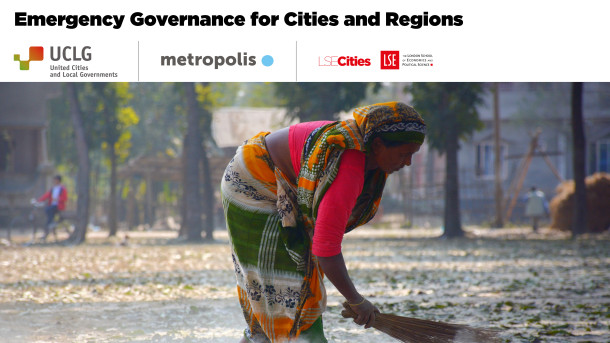
Governance structures must be upgraded to properly respond to complex emergencies
The Covid-19 pandemic has brought to light the need to respond to the most pressing issues in urban societies, including access to adequate housing, public spaces and green areas, mobility, services and infrastructure, to name just a few. These issues are not only linked to the health crisis, but are also directly related to other complex emergencies, such as climate change and inequality; which highlight the need for upgrading our governance structures in order to provide a proper response.
To support local and regional governments, Metropolis, UCLG and LSE Cities joined forces in mid-2020 to analyse the impact of the global health crisis and provide insights on how to build the institutional capacity to respond to similar global emergencies in the future. Since then, through the Emergency Global Initiative (EGI), our work has been focused on emergency governance innovations at a subnational level, governing complex emergencies, and funding the emergency response.
What have we learned so far?
Let’s start at the beginning. Understanding social and climate challenges as emergencies allows governments to move from gradual, long-term processes to radical action. The focus on rapid implementation is key, because failing to respond to these emergencies can erode cultural, civil, political and economic stability in our societies. Moreover, complex emergencies require different governance approaches and a social justice lens to unlock opportunities for societal innovation, improving wellbeing and an inclusive economy.
To step up to the challenge, many local and regional governments are innovating to protect people’s wellbeing and access to services and opportunities. For instance, during the Covid-19 pandemic, many subnational governments introduced innovations in terms of leadership, stakeholder engagement, and data management. In particular, Seoul adapted its existing tech structure to develop a contact tracing system, Bogotá focused on communication based on transparency and active listening to create co-responsibility between citizens and the government, and Barcelona overcame ideological differences by bringing together a wide range of stakeholders to co-create solutions to the Covid-19 crisis.
Although innovation has been at the heart of the response of subnational governments, many have reported gaps in their knowledge on how to innovate in terms of finance. The Covid-19 crisis has underlined the limitations of the financial architecture of local and regional governments, particularly regarding their capacity to generate their own resources, invest in long-term services and infrastructure, and access credit and capital markets. These limitations have placed additional pressure on local and regional budgets in their short-term response to the pandemic and their long-term recovery strategy.
What can be done?
On governance
Start by developing emergency governance systems based on leadership, human rights and social justice, accountability and transparency, a holistic and whole-of-government approach, stakeholder engagement with clearly defined responsibilities, and flexible planning and implementation. This can be achieved by establishing a basic emergency governance framework at a city and regional level, creating an emergency assembly of scientific advisers and citizens, and establishing coordination and feedback loops between different levels of government.
On finance
Start by enhancing the fiscal autonomy of subnational governments and granting greater financial flexibility to help them respond more efficiently in emergencies. This can be done by giving city and regional governments more discretion and responsibility and putting solid accountability frameworks in place. Continue by promoting active collaboration and solidarity-based financial mechanisms instead of rewarding competition. The uneven impacts of the Covid-19 crisis show that we need greater cooperation to transition to a more just and equitable society.
Do you want to learn more? Read our Policy Briefs!
- Policy Brief #01: Understanding emergency governance innovations at a subnational level
- Policy Brief #02: Understanding complex emergencies
- Policy Brief #03: Understanding emergency finance
For further information, please contact Oscar Chamat, Research and Policy Officer at the Metropolis Secretariat General.
